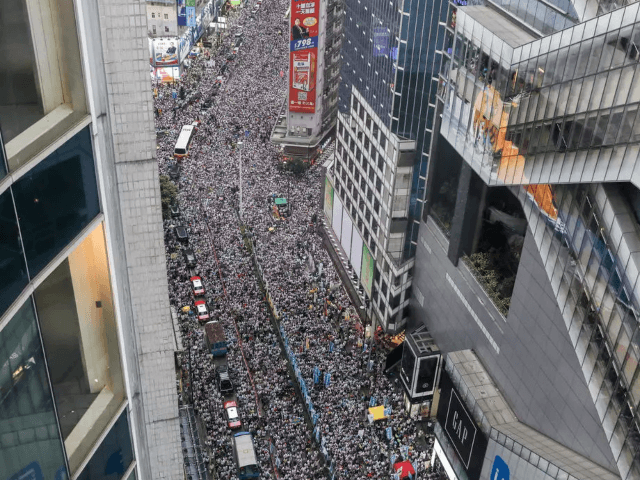Hong Kong activists defied orders from the police and marched on Tuesday to commemorate the one-year anniversary of the protest movement, which began with the debate over a law that would have made extraditing criminal suspects to China easier and which many fear could end with a national security law that Hong Kong’s legislature will not get to vote on at all.
Police officials warned they would “deploy adequate manpower in relevant locations” and “take resolute action to enforce the law, including making arrests,” especially if demonstrators blocked traffic or impeded access to government buildings.
Hong Kong authorities added they have seen “malicious and irresponsible” Internet posts urging “rioters” to throw gasoline bombs during Tuesday protests in an effort to “force police to deploy tear gas.”
Demonstrations nevertheless began around lunchtime on Tuesday. RTHK News found a few hundred protesters gathered at shopping malls, shining the lights on their cell phones like torches, hanging banners, and chanting protest slogans.
While RTHK reporters were covering one event, a lone pro-Beijing activist showed up, started a brief argument with the pro-democracy crowd, and was escorted off by security. Riot police were present outside the malls but did not intervene in the demonstration.
Human Rights Watch (HRW) commemorated the anniversary by warning that Hong Kong’s autonomy and the fundamental rights of its citizens are at risk from the oppressive national security law China is preparing to impose, bypassing the Hong Kong legislature in the process.
“For the past year, Hong Kong people have made clear their peaceful demands for freedom and autonomy, but the authorities in Beijing and Hong Kong choose to respond with ever-greater repression and violence,” said HRW’s Sophie Richardson on Tuesday.
Pro-democracy activist Joshua Wong, one of several dissidents and legislators who believe they are now under surveillance by mainland intelligence agents, said he has “strong confidence in Hong Kongers that we will have ways to resist and defy” the Chinese Communist regime.
“Moreover, I hope the world can stand with Hong Kong and protect the city from falling,” he said.
By Tuesday evening there were thousands of demonstrators in the streets, recreating a scene common from the past year of protests as police blocked off roads, deployed pepper spray, and filed new charges. Several prominent members of the pro-democracy movement said new and more serious charges were suddenly filed against them for occupying the legislature building last year, hinting at a crackdown to come as the new security law goes into effect ahead of July 1, a major symbolic date for demonstrators because it is the day China took control of Hong Kong back from the British.
Hong Kong’s pro-Beijing chief executive Carrie Lam, who has been strongly criticized by the protest movement for her handling of the island’s political crisis, observed the first anniversary of the movement by calling on all Hong Kongers to behave as “responsible and sensible” citizens of China.
“The immediate issue is to prove that One Country, Two Systems works well in Hong Kong. And to prove that Hong Kong people are reasonable and sensible citizens of the People’s Republic of China, that we could be trusted to continue to have our own way of life, and our own way of system within the whole country,” Lam said.
One Country, Two Systems is the common name for the limited autonomy granted to Hong Kong when China reclaimed control from the United Kingdom in 1997. Critics of the impending national security law see it as a violation of One Country, Two Systems, while defenders claim the law is vital to preserving the system – often, as with Lam’s remarks, implying that Beijing’s patience with Hong Kong will soon run out unless the law is implemented.
Far from reaching out to the protesters on the June 9 anniversary, Lam excoriated them as a tiny, unruly minority who are “going against the interest of 7 million Hong Kong people” by making it hard for them to “get through difficult times” caused by the coronavirus pandemic.
Referring to a threatened strike by students and trade unions next week, Lam said the people of Hong Kong would not “welcome that sort of strike action when their greatest worry is losing their jobs and facing difficulties in their daily living.”
Lam admitted that all sides of the debate should learn some lessons from the protest movement and strive to provide a “stable and peaceful” life for everyone.
“Everyone has to learn a lesson. The SAR [Special Administrative Region] government has to learn a lesson, I hope each and every lawmaker will learn a lesson too,” she said.
“Hong Kong cannot bear such chaos,” she warned. “Hong Kong citizens want to live and work in a stable, peaceful environment, especially in the face of the global economic recession triggered by the epidemic.”
Lam promised that her administration would work with Beijing to fully implement the national security law and criticized its greetings for “smearing” the legislation with their calls for a strike.

COMMENTS
Please let us know if you're having issues with commenting.